
Chetna Gala Sinha: The silent crusader
With her Mann Deshi bank and foundation, Chetna Sinha has turned sleepy, rural Mhaswad into a seat of entrepreneurial aspirations for women
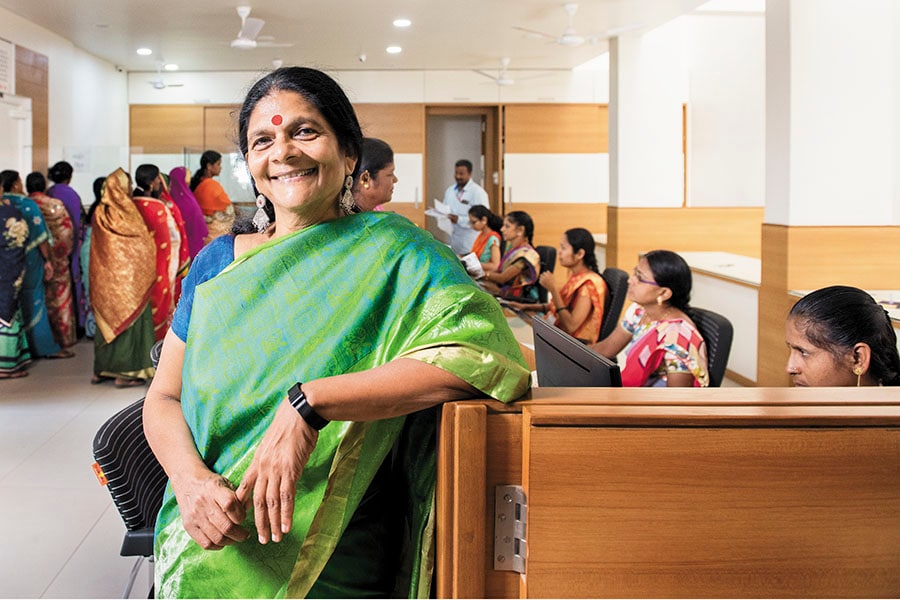 Images: Mexy Xavier
Images: Mexy Xavier
Forbes India Leadership Award 2017: Entrepreneur With Social Impact
Vanita Pise’s single-storeyed house just off the village centre in Mhaswad, in Maharashtra’s Satara district, is abuzz on the eve of Diwali. Pise is on her feet delivering instructions and inspecting how a consignment of wheat has been packaged by a cluster of villagers milling around. Once done, she retires to an adjacent room and settles down in front of a machine into which she nimbly feeds sheets of paper, seven to a batch, to be cut and chiselled into plates. Sets of finished bundles are arranged in ceiling-high stacks around the room, perhaps dwarfed only by her entrepreneurial ambitions.
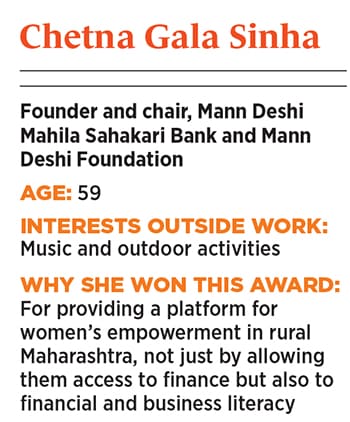
Pise wouldn’t have imagined her current life when she came to Mhaswad as an 18-year-old bride in 1991. The family she was married into had a poultry business that ran into losses when avian flu struck, and income from working in the fields was meagre, about₹50 per day. In 2004, she opened an account at the Mann Deshi Mahila Sahakari Bank, a local cooperative bank for and by women, as part of a self-help group. But Pise was diffident about the bank and its officials—bade log, as she felt they were—till one of the members started talking to her, wrapping her arms around her shoulder. “Why don’t you take a loan if you want to start a business?” she told her.
For Pise, loans only evoked fears of moneylenders and non-repayment; but the lady put her through financial literacy classes at the bank that finally convinced Pise to take her first loan of ₹10,000 to buy buffaloes. “My income shot up to ₹4,000-5,000 a month from selling milk. Within a year, I was able to pay back the loan. With more loans subsequently, I have built multiple enterprises. I now have a dealership of paper plates and earn enough to have my three children complete higher education. But nothing compares to the confidence I got when I repaid my first loan,” says Pise.
As Pise would come to know soon, her unassuming Good Samaritan was Chetna Gala Sinha, the founder of the bank which was the first bank in the country for and by rural women to receive a cooperative licence from the Reserve Bank of India (RBI). In the two decades since the bank was set up (in 1997) with a working capital of ₹7,08,000 raised from among its 1,335 members, it has reached over 3,10,000 women (84,000 among them borrowers), providing them with the financial backing and emotional impetus to become successful entrepreneurs. From its single branch in Mhaswad, Mann Deshi now operates with a working capital of ₹150 crore across seven branches in Maharashtra.
Sinha also chairs the Mann Deshi Foundation, a sister organisation, that has expanded its scope beyond its financial core and evolved into an umbrella platform for community initiatives—organising cattle camps, building check dams, running a local radio station and sports talent hunts—in western Maharashtra. The large murals and posters—of overflowing water in an otherwise-parched river, of rural women queueing up in front of ATMs, for instance—on the walls of the swanky, new three-storeyed office of the foundation stand testimony to its outreach. And for Pise and many others whom she mentored, the 59-year-old, or bhabhiji as she is fondly called, remains an icon who scripted a microenterprise movement in the region that helped pull lakhs of rural women out of abject poverty.
**************
Sinha grew up in Mumbai in the ’70s and ’80s in the heyday of political activism. While in college—she did her BCom and has a master’s in economics from Mumbai University—she was drawn to Jayaprakash Narayan’s brand of socialist politics. It was through her political forays that she met her husband, Vijay Sinha, an activist-farmer from Mhaswad, and relocated in 1987. It turned out to be a definitive move.
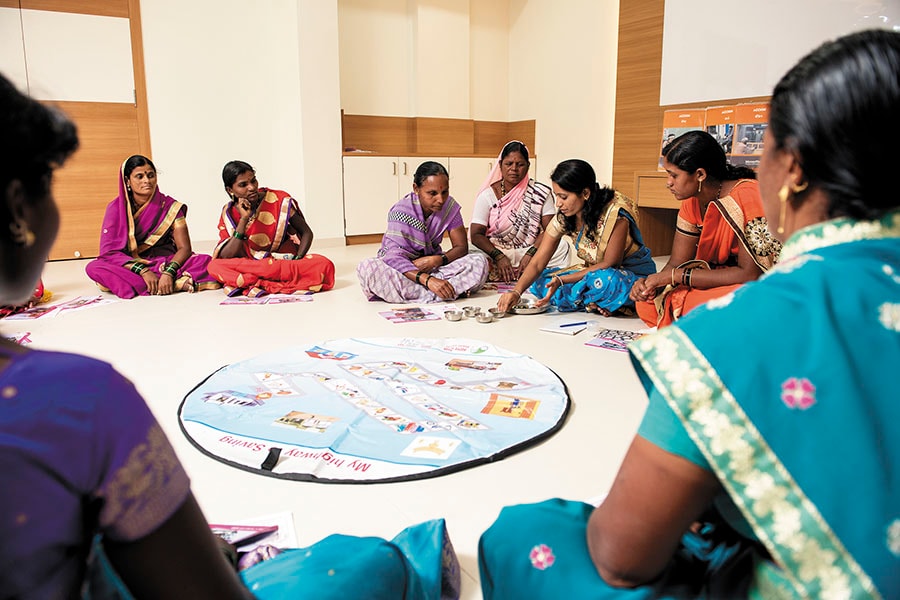 A financial literacy class at the Mann Deshi Foundation, where women are taught the ropes of saving and investing through modules that comprise games like Monopoly
A financial literacy class at the Mann Deshi Foundation, where women are taught the ropes of saving and investing through modules that comprise games like Monopoly“When I arrived, I had no idea they didn’t have a toilet in the house. The next morning, when I asked Vijay about it, he told me to go to the fields behind the house and carry a stick should pigs come following. I decided that’s it; we needed to change a few things in the village. This also brought about a paradigm shift in my political agenda: From ‘down with capitalism’ slogans to petitioning for toilets in the house, electricity in the village, and fighting with bus station masters about three-hour delays,” says Sinha.
Sinha’s movements for basic rights were intertwined with her stint at the Shetkari Sanghatana, founded by the late Sharad Joshi, where she tried to bring more women into gram panchayats. Through these meetings, she came across Kantabai Salunke, a welder, who complained that banks had turned down her request to open a savings account as she saved less than ₹5 a day. She insisted that she had saved up to buy a tarpaulin sheet to shelter her children during monsoon. “Through her came my first learning, that savings had nothing to do with surplus but financial targets. With that, my activist side emerged and I said ‘Let’s open a bank’,” she says.
She suffered her first setback when the RBI rejected her application, in 1996, on the grounds that some of the promoting members were non-literate. Sinha came back to the village dejected, but the other villagers pushed her to organise literacy classes. “They told me they may not be able to read and write but they were good with numbers. There came my second learning. Literacy is not just about reading and writing,” says Sinha, an Ashoka, Yale and Schwab fellow.
In five months, Sinha went back to the RBI with a fresh application and the women in tow. “I hardly spoke. These women told the RBI staff that even if they couldn’t read and write, they could calculate the interest faster than them. In a meeting that lasted for over two hours, they had the official spellbound,” adds Sinha. “In four months, I got my licence.”
Within a few days of the launch, Sinha hit another roadblock as she saw the number of customers dwindling; the women were losing out on working days if they had to trek all the way to the bank, she was told. Sinha decided to introduce doorstep banking and started visiting villagers at their homes for transactions.
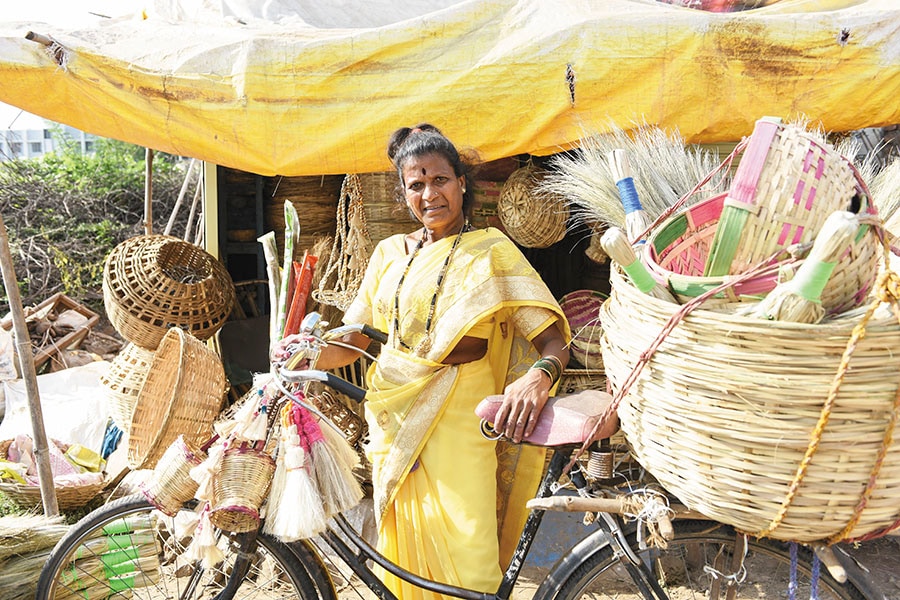 Baby Hira Jadhav, who makes baskets and brooms, received tips on economies of scale from the Mann Deshi Foundation’s business school
Baby Hira Jadhav, who makes baskets and brooms, received tips on economies of scale from the Mann Deshi Foundation’s business school
The drive remained relevant even after two decades, when Prime Minister Narendra Modi announced demonetisation last November, leaving the local vendors in the lurch: Some sold their wares for whatever they could, way below the market prices, some others gave away their ₹500 notes for a lower value. Mann Deshi officials collected coins from the State Bank of India and went from door-to-door and in the weekly markets to exchange them for old ₹500 notes.
For a financial institution that typically deals with a low-income constituency, how does it overcome bad loans, a problem that many bigger banks are grappling with? “We have a gross NPA [non-performing assets] ratio of under 3 percent and we manage to do that because our financial products are designed keeping in mind inflows, enabling the borrowers to repay easily through weekly or daily instalments. This is unlike bigger banks, where such products are structured with the assumption that they will eventually turn into NPAs,” says Sinha.
************
With her credentials, Sinha can segue between the roles of an economist, a farmer and an activist with ease. But her USP lies in straddling lofty theories with the realities at the grassroots, in abandoning armchair activism and translating her vision into practices that work in a local context. Take for instance the time Kerabai, a shepherd, walked into her bank to seek a loan for two cellphones—one for herself and the other for her mother-in-law, with whom her son stayed during the months she was away. The Mann Deshi staff asked Kerabai if she knew how to operate a cellphone. She said she didn’t and asked in return, “Why don’t you teach me?”
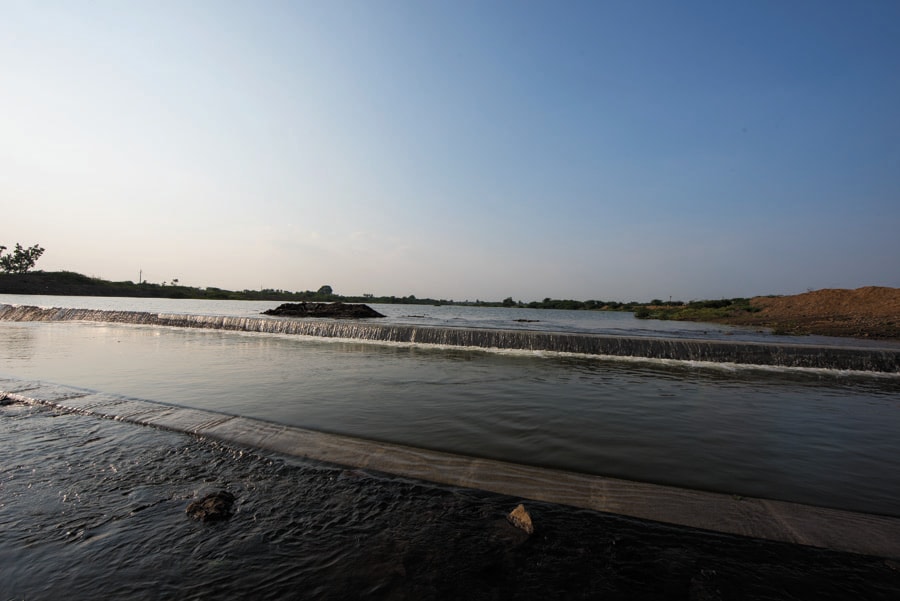
A check dam built by the Mann Deshi Foundation in Mhaswad to tackle drought
Her candid confession planted a thought in Sinha’s mind and, in 2006, she brought it to fruition by starting a business school at the Mann Deshi Foundation. Not your run-of-the-mill vocational courses, but with modules customised to train rural women in setting up businesses, and in running and scaling them up. How to run a fast food centre, a home bakery, rear cattle, do up a mehndi or ward off unwanted attention if you are setting up a shop on the roadside.
If you want your business to last, never compromise on quality, Pise was told. Baby Hira Jadhav, who took a loan of ₹1,000 to start a business of making baskets and brooms, was advised to reduce her prices to bring in more customers. Economies of scale, explained sans academic drivel.
According to the Mann Deshi Foundation, there has been an increase of ₹13,200 in the average annual income of rural women after they’ve taken business development classes at the school.
It is through the business school and its partnership with the Nimbkar Agricultural Research Institute in Phaltan, Maharashtra, that Mann Deshi conducted one of its most successful programmes—of breaking into a male bastion and training women in the vaccination and artificial insemination of goats.
Since its inception in 2014, 21 trained goat doctors have vaccinated over 8,000 goats and artificially inseminated over 3,000 across 50 villages in a region that predominantly houses cattle-rearers.
“Mann Deshi provides a powerful platform for women’s empowerment in India. It sets itself apart by being one of the only organisations focusing on both—access to finance on one hand, and to financial and business literacy on the other. One of its key differentiators is that it goes beyond traditional vocational courses like tailoring, computer literacy, etc, and develops rural, women entrepreneurs by providing business skills and exposure,” says Harpreet Bagga, head of department, capacity building, Dasra, a strategic philanthropic foundation that connects funders with social enterprises.
The Mann Deshi Foundation also runs financial literacy classes, where women are taught the ropes of savings, investing, insurances and loans through modules that comprise games like Monopoly.
One of its earliest students was Shobha Jadhav, a grocery shop owner who, at that time, would earn about ₹500 a day and blow it all up on daily expenses. “Based on her inflow, we gave her a small loan to start an eatery in her village, besides her shop. She now earns ₹4,000-5,000 per day from the business and saves around ₹5,000-6000 per month, squirrelling away money for her son’s engineering degree,” says Vidya Shinde, first a student and now a coordinator for the financial literacy classes. For villagers living far away, the Mann Deshi Foundation has organised mobile schools on buses that drive up to 40 km from the heart of Mhaswad.
In 2014, the foundation set up a chamber of commerce to mentor aspiring women entrepreneurs. Now, there are three such chambers. It also operates a toll-free number to provide them with instant business solutions.
The Great Eastern Shipping Company, which committed ₹1.02 crore (for 12 months since February 2016) to the chambers of commerce as part of its CSR project, says about 70 percent of the target was met by October 2017.
Says Unnikrishnan TS, the CSR head, “Something significant about the project is that for the women who are beneficiaries, starting a business or strengthening their existing business is only a beginning. With improved livelihood, these women want to ensure that their children get quality education and health care. That is so exciting.”
*************
All through her journey with Mann Deshi, Sinha’s focus remained steadfast on the financial well-being of the rural community. It changed in 2012, when Mhaswad faced one of its worst droughts in recent times and Sinha’s branch manager informed her of the rise in mortgage to buy fodder and water for the cattle. While Sinha was still in two minds about whether to expand the scope of the bank and organise a cattle camp, the choice was foisted on her by one of her customers who asked her, “If we migrate with our animals, who would you bank with?”
In five days, over 2,000 farmers with 5,000 animals joined the camp that took off on water tankers bought off personal loans. It spanned over a year-and-a-half, serving over 14,000 animals. It was during the cattle camp that Sinha decided to address the root cause of the crisis and build check dams to hold back water, increase crop yield and effectively stem the migration of the villagers, sometimes as far as 300 km, during the dry months. In five years, the Mann Deshi Foundation has built 10 check dams giving the large farming and shepherd community a means to livelihood round the year.
Says Uttam Linge, a farmer from the Mahadev Mala area, “Earlier we could somehow grow onion, wheat and jowar with the water that would percolate into our wells and stay for 2-3 months. But sugarcane, which has given western Maharashtra the sobriquet of a sugar bowl and which would bring us good money, was out of question as it was a water-intensive crop. It has changed now with the check dams that Mann Deshi has built and the river holds water longer than we’ve seen for generations.”
Sinha’s ability to connect with people also ensured that she was able to tap into the natural athletic ability of those in Mhaswad and convert it into a sports champions programme, now managed by her elder son Prabhat. One of its earliest beneficiaries, Lalita Babar, who was given a bicycle for her daily commute from her home to school, recently represented India as a steeplechase athlete in the 2016 Rio Olympics. Since 2011, the programme has trained 4,000 athletes, many of whom have shone in state and national levels.
Mann Deshi’s sports field in Mhaswad is the only one available in the taluka and boasts of a 400 m track, a trained coach and annual camps, among others. One of its recent successes would be the trio of Vaishnavi Sawant, Poonam Kalel and Reshma Kewate who travelled to the US for two weeks in September and trained with Olympians at the Lake Braddock High School in Virginia. Or Sarita Bhise, a member of the nomadic shepherd community and a national-level field hockey player, who was spotted during her 5 km running commute between her home and school. “As we involve more and more girls in sports programmes, the incidence of child marriages is coming down. Girls are being respected and family attitude towards them is changing,” says Prabhat.
What next for Sinha? A restructuring of the agriculture marketing system to give the farmer greater bargaining power through the farm-to-market value chain. Mann Deshi is setting up a cold storage as part of a central programme to minimise wastage for farmers and save produce for the next market.
From Mumbai to Mhaswad, Sinha has come a long way, and is still shaping this journey to remember.
(This story appears in the 30 November, -0001 issue of Forbes India. To visit our Archives, click here.)





